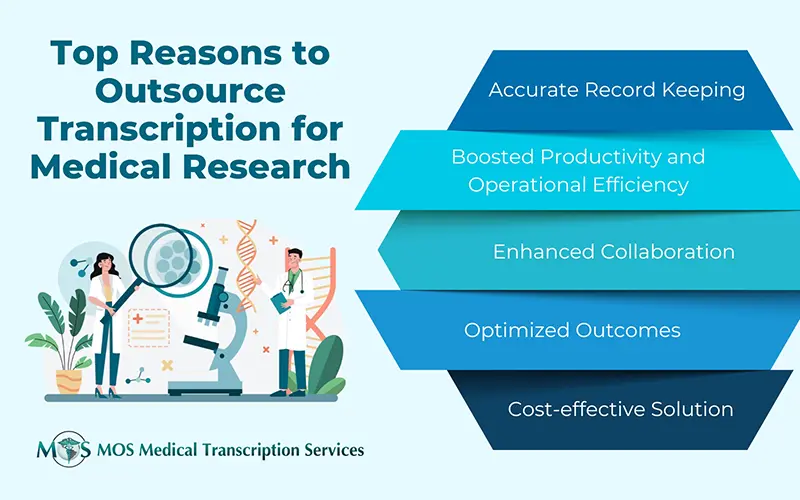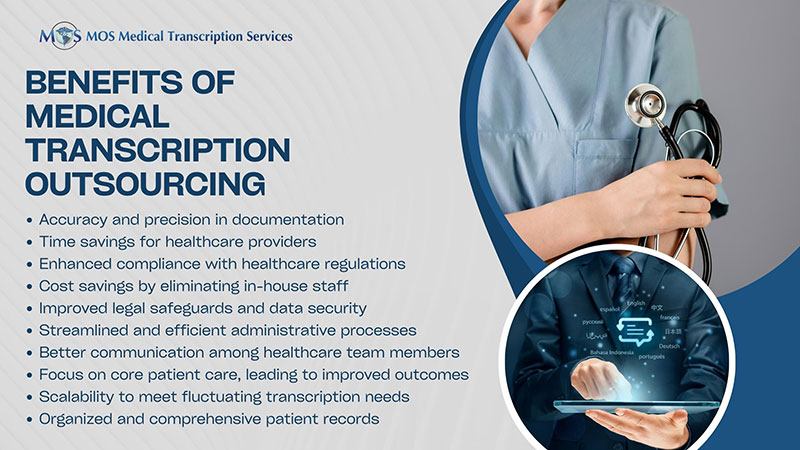Table of Contents
Medical researchers rely on generating, analyzing, and studying massive amounts of data for making scientific breakthroughs and conducting hypothetical testing. However, the process of generating, collecting, and organizing data for research activities is a daunting task. This is where medical transcription services play a crucial role in enhancing research activities by converting dictated medical notes into text format. By accurately converting data from various sources such as patient interviews, clinical trial observations, and physician’s notes, HIPAA-compliant medical transcription services enhance clinical outcomes in the research field. Leading outsourcing companies offer cost-effective transcription options for medical researchers.
Benefits of Outsourcing Medical Transcription for Clinical Studies
Outsourced transcription solutions for physicians are an essential asset in transforming vast amounts of audio information and observations into actionable, accurate documentation. By accurately capturing the medical jargon, terminology, and abbreviations, experienced medical transcriptionists improve data accessibility. Timely and precise transcribed documents promote medical research data accuracy. Below are the key advantages of outsourcing research transcription:
- Accurate record keeping
Transcriptionists help research facilities and medical institutes maintain accurate and error-free clinical records. By converting fragmented, sometimes difficult-to-decipher audio recordings into structured, comprehensive written files, they establish a systematic document management process. Efficient and quick access to qualitative data through organized documents ensures streamlined workflows, better data retention, and reduced errors in research documentation. - Boosted productivity and operational efficiency
Clinical recordings could be complex, unstructured, and time-consuming in nature, requiring careful attention to ensure accuracy. Transcription acts as a tool in addressing these challenges efficiently, converting spoken content into clear, searchable text. This allows researchers to easily find patterns, anomalies, and trends in text-based records more swiftly. Data integrity in healthcare research frees up valuable time and allows researchers to concentrate on high-priority tasks. - Enhanced collaboration
Effective collaboration is the foundation of medical research, facilitating scientific advancements and new discoveries. Transcription aids in collaborative medical research by providing researchers, health research centers, and scientists with precise textual records. This ease of sharing allows teams to analyze data collectively, address complex healthcare issues, and accelerate development of treatments for various conditions. Furthermore, transcribed documents can be easily translated into multiple languages, fostering greater collaboration and inclusion of international research teams. - Optimized outcomes
Outsourcing transcription is a strategic approach for optimizing research data management, allowing researchers to redirect their focus towards core medical activities. Since transcribed documents are inherently organized and comprehensive, it serves as a roadmap for guiding clinical experiments, stakeholder meetings, and clinical validation processes. By minimizing the chances of misinterpretation that may arise from audio recordings, it ensures research findings remain accurate, consistent, and reliable. Ultimately, transcription for scientific studies creates accessible, well-documented records that allow future researchers to build on past work, supporting long-term, comparative, and longitudinal studies. - Cost-effective Solution
By relying on external services, research organizations can bypass the overhead costs tied to hiring and training full-time transcriptionists, along with maintaining expensive in-house equipment. This is a more cost-effective solution for managing large volumes of research data. By scaling transcription needs as required, organizations can ensure they only pay for the services they use. This reduces both administrative and operational expenses, enabling research institutions to allocate their resources more effectively and focus their budgets on core research activities and innovation.
Choosing Transcription Solutions for Healthcare Research Documentation
Selecting the best transcription services for healthcare research is essential to enhance their workflows, optimize outcomes, and maintain high-quality research standards. With the increasing volume, complexity of medical data, and the critical nature of research findings, organizations must partner with a professional company capable of supporting data integrity in healthcare research.
- Quality assurance: A reputable transcription service should offer access to trained professionals, advanced tools, and faster turnaround times for all their clients. They should be able to customize and scale services according to your specific requirements and needs, without compromising on quality or speed.
- Affordability: While affordability is an essential factor, healthcare facilities should not sacrifice quality for cost. Opting for the cheapest available options may diminish the quality and safety of data. Instead, focusing on value for money will yield long-term benefits. A trusted service will offer clear pricing models with no hidden fees, multiple payment options, and flexible terms.
- Request and analyze sample works: Request sample works from potential services that are relevant to your field to compare and assess their quality. Comparing different samples side-by-side will help identify even minute errors or discrepancies that may be overlooked when analyzed individually. Pay close attention to details such as medical accuracy, page formatting, readability, and overall quality of the transcripts.
- Data security and compliance: Healthcare data is highly confidential and sensitive. Choose a company that provides HIPAA-compliant transcription solutions for researchers with robust data security measures such as anti-virus software, access controls, and encryption techniques to safeguard medical documentation.
- Investigate customer reviews and testimonials: Evaluate customer reviews and feedback. Read reviews on their website and platforms such as Google My Business to gauge previous customer satisfaction. Seek peer testimonials to directly learn about customer experience, turnaround times, and any recurring issues or complaints.
Choosing the right transcription provider is essential for accurate and efficient healthcare research. By converting audio into precise text, these services support better data analysis, streamlined reporting, and high documentation standards. They also help ensure compliance with ethical and legal regulations. With accurate and reliable outsourced medical transcription services researchers can save time and focus on analysis, improving both productivity and data integrity.




